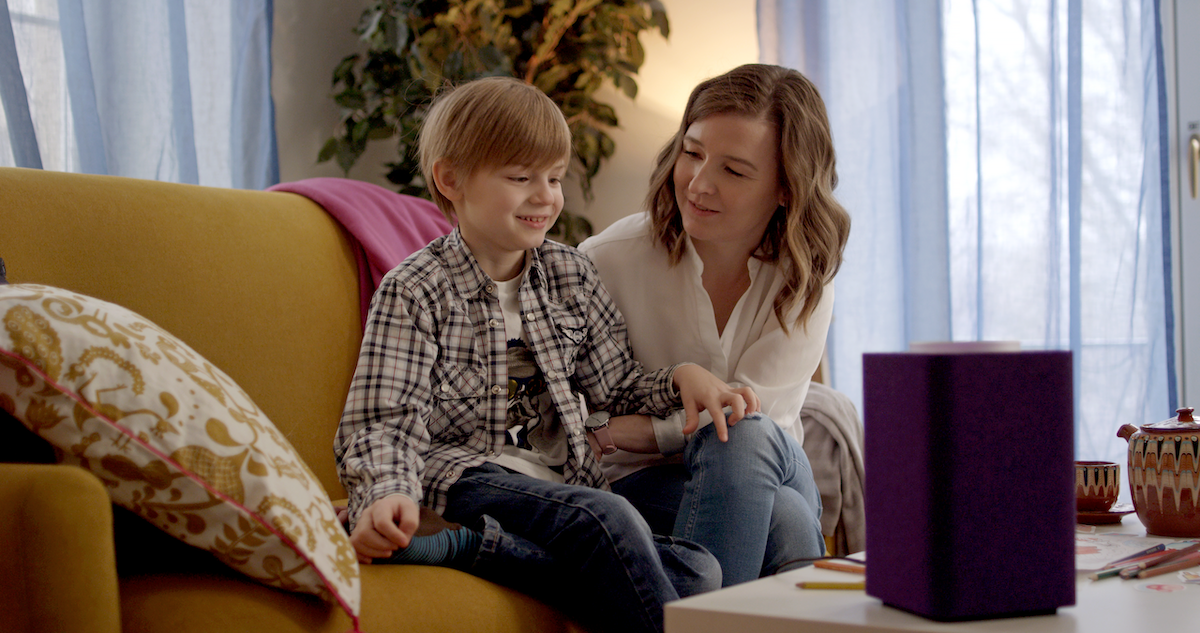Yandex has always taken a particular interest in cultivating positive environments that aid in children’s development. Our late co-founder Ilya Segalovich brought his passion for youth development to Yandex through initiatives such as Yandex’s outreach programs at Russian orphanages, including Maria’s Children, founded by his wife. We’ve carried on the spirit of Ilya’s compassion for children through our education programs and tools designed to create positive learning environments, such as Yandex.Textbook.
As we continuously create innovations, we’re exploring more ways our intelligent ecosystem can also provide tools for children and their parents. Our intelligent assistant, Alice, has been central to this effort, offering educational and developmental support through skills such as “guess the animal” and math games that promote cognitive learning. Last year, our in-house creative team set out to create a skill for Alice that would specifically address an important childhood development issue in Russia using our AI. Today, after a year developing and testing interactive songs with a team of speech therapists, we are proud to introduce parents, children, and teachers to SoundsEasy, a skill for Alice designed to help children with speech disorders and other early speech impediments.
According to Russia’s former Minister of Education, nearly 60% of school children struggle with speech problems (in Russian). We learned that speech disorders are particularly challenging to tackle in Russia due to a lack of qualified speech therapists, and many parents are unaware of the issues and their impact. In many cases, early speech problems can lead to other developmental concerns that lead to consequences later in life, such as speech impediments. Our creative team started researching how we could help improve this with our technologies. While correcting speech needs to be managed by professionals, a skill for Alice could help children practice sounds and form better habits through repetition.

SoundsEasy offers a selection of catchy and fun songs for forming proper speech habits through interactive recitation with fun characters led by our AI. Each SoundsEasy training exercise has three parts – the warm-up, syllable practice, and repeating lines from the songs. Using our speech recognition, Alice carefully listens to the speaker and then compares what it hears with the correct pronunciation of the lyrics. Alice then kindly suggests the child repeat the phrase if it doesn’t match what the assistant is expecting to hear. The characters within SoundsEasy rely on our speech synthesis technologies to naturally interact with children on the content, providing stories, feedback, and encouragement.
Together with a team of speech pathologists, poets, local pop stars, and psychologists, we created SoundsEasy to help improve the current and future lives of children with speech disorders. Speech pathologists provided their expertise to design songs for practicing different sounds, ensuring songs don’t mix difficult sounds that would be overly challenging for listeners. Using the guidelines for writing the songs, poets advised on the lyrics and pop artists recorded catchy songs that are similar to modern pop hits.
We then developed characters with a unique personality for each pop star called Soundies. We designed the Soundies to combat issues such as dyslexia, dysgraphia, or stage fright that are often a result of speech problems. For instance, Soundies explain why performing on stage is fun and not scary. We also integrated new lyrics into familiar songs from the popular Fixiki cartoon. Fixies characters, which millions of children across Russia already know and love, introduce listeners to exciting technologies and futuristic professions such as “Drone Racer,” and they’ll now be able to help children practice their speech.
Psychologists provided feedback for adjustments, such as adding more encouragement. The characters now offer more praise, and we introduced other motivational features. Children get a coloring exercise upon completing songs, which serves to also stimulate motor skills. SoundsEasy also aims to promote other essential learning values, such as reading and writing.

Children were also some of the most important collaborators. Through user experience testing, their feedback helped us refine the skill; for example, through our testing, we observed how antsy and excited children tend to be, which is why we added interactive activities to occupy them through the speaking exercises. More importantly, though, the testing period allowed us to see firsthand how much value this new tool will bring to their lives. Several of the children who tested the skill returned home to continue trying it out with their families on their own Alice-enabled devices.
We are so grateful for all the teamwork and expertise of everyone who contributed to the development of SoundsEasy. Not only will millions of children and parents benefit from using this interactive Alice skill at home or on the go, kindergartens and other early childhood education centers’ in Moscow will begin using SoundsEasy as part of their curriculum. Speech therapists will also be able to utilize SoundsEasy for Alice by assigning certain songs for children to practice at home, and we hope to soon incorporate SoundsEasy in teaching curriculums at schools across Russia.
While this is an excellent use of our AI, SoundsEasy also reflects the values of Yandex as a company. We hope SoundsEasy raises more awareness of children’s development issues and speech disorders specifically. We’re excited for all the ways SoundsEasy and future AI innovations will help advance childhood development.